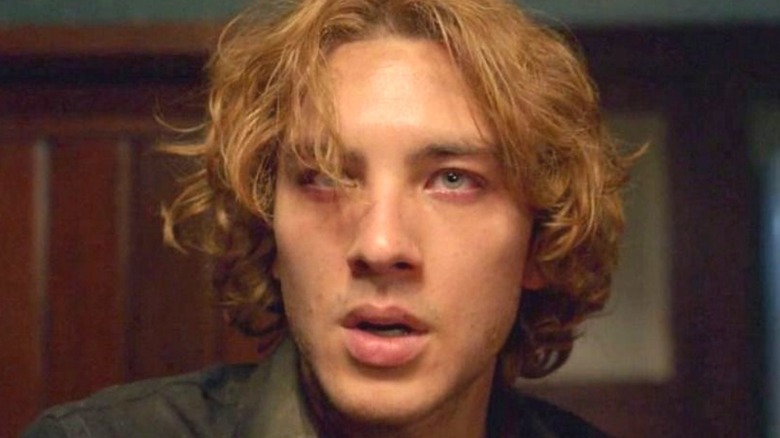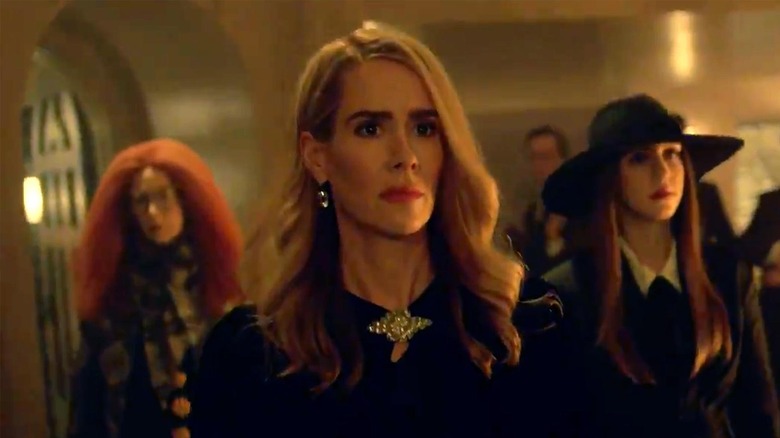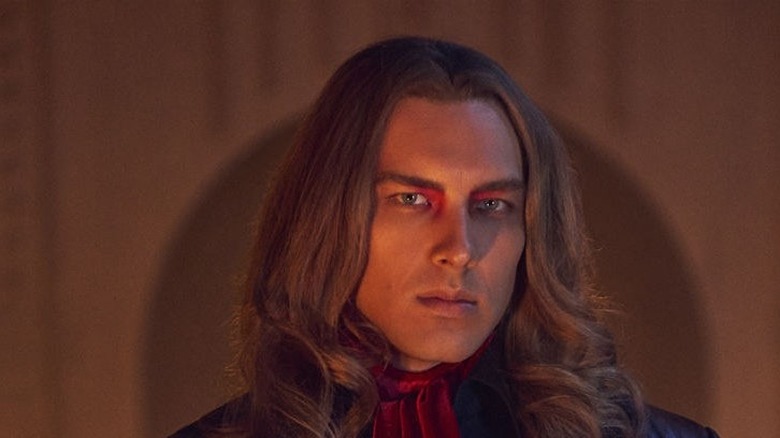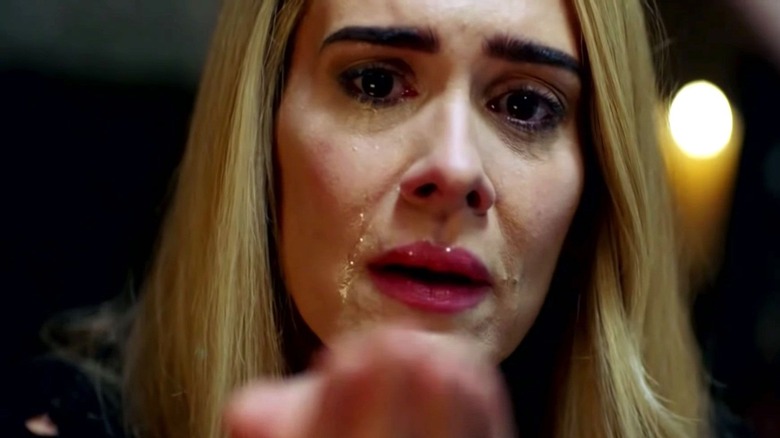The Ending Of American Horror Story Season 8 Explained
Season 8 of "American Horror Story: Apocalypse" ends with a bump instead of the bang, and all that was wrong with the world is right again, thanks to the witches from Season 3's "Coven." While some seasons of Ryan Murphy's anthology series explore the fallibility of humankind and the ease with which people inflict cruelty upon one another, "Apocalypse" is more of just a supernatural slugfest between good and evil.
"Apocalypse" was an ambitious undertaking, and Murphy's vision for the end of the world began with Season 1's "Murder House" with the birth of Vivian Harmon (Connie Britton) and Tate Langdon's (Evan Peters) bad seed. Despite being the Antichrist, Michael Langdon (Cody Fern) may be one of Murphy's least complicated villains since most of his behavior boils down to daddy issues.
The Season 8 finale, "Apocalypse Then," manages to bring all the stories full circle. Much of the carnage inflicted during the season is undone, meaning life goes on for fans' favorite characters. However, looking back, it lowers the stakes when viewers realize there is no finality in death, but that's exactly the point, as Mallory points out (more on that later). Fans may be thrilled with the clean slate granted by the ending's giant time travel do-over, but the episode's final moments also mean evil is never vanquished, which isn't exactly leaving things on a high note either.
The Apocalypse finale showcases female solidarity and strength
Murphy surrounds himself with muses, and his female protagonists are flawed, resourceful, intelligent, resilient women. It makes sense that the "Coven" witches are the ones who face off against Michael to determine the fate of humanity. They embody all of those characteristics to the extent where they are literally magical creatures. Unlike the fractured group viewers saw in season 3, this coven under Cordelia's (Sarah Paulson) leadership is nurturing and supportive. They are a testament to what happens when women build each other up instead of tearing each other down. Unlike her mother, Fiona (Jessica Lange), Cordelia is willing to sacrifice herself for her sisters. Even Madison (Emma Roberts) and Voodoo Queen Marie Laveau (Angela Bassett) get a chance to redeem themselves by exhibiting a selflessness their characters previously lacked.
"Apocalypse's" finale is very much about female empowerment, which is evidenced not just by the actions of the coven as a whole but by how the series wraps up Coco's (Leslie Grossman), Mallory's (Billie Lourd), and Constance's (Lange) stories. The Murder House crossover episode revealed that Constance, who always misguidedly bragged about her maternal instinct, resigned herself to live in fear of her grandson until she finally escaped by committing suicide. However, when Mallory travels back in time, viewers see a very different Constance who stands up for herself despite the risk. Mallory and Coco, who question their abilities and contributions to the coven, both demonstrate confidence and an increased sense of self-worth during the showdown between the witches and Michael.
Season 8 is a battle of good vs. evil
Every installment of "AHS" explores the societal constructs of good and evil, usually from a secular standpoint, with "Asylum" being the obvious exception. Some seasons are more nuanced when it comes to offering theories about what drives people to do bad things and at what point does inherent darkness that resides within everyone make the transition to evil. The line is clear-cut in "Apocalypse" because nothing is so universally understood to be evil as the devil. "Apocalypse" does try to give Michael some emotional depth, portraying him at times as someone seeking acceptance and validation, but by the end, he's more certain of his place in the world, even if it's just destroying it. Fern, who made his "AHS" debut playing the Antichrist, discussed his character's transformation from earlier episodes to the finale with The Hollywood Reporter. "So in that sense, he's a very righteous character. He's just carrying out the work of his father, which is to bring about what I would say is the proper mode of humanity, in his eyes." All of Murphy's characters, both those perceived by viewers to being either villains or heroes, feel justified in their actions.
There's also a randomness to the evil in "Apocalypse," reinforced by the finale's final moments. Why were Timothy (Kyle Allen) and Emily (Ash Santos) chosen as the parents of the next Antichrist? Evil is also enduring, as is good. There's a symbiotic relationship between the two because one can't exist without the other. Mallory extinguishes one threat just to have another take its place.
Season 8's ending explores the fluidity of life and death
While Mallory's trip back in time negates the apocalypse, effectively hitting a restart button for all of the characters, not everyone benefits from the time travel twist. Madison's and Behold Chablis' (Billy Porter) efforts to help the inhabitants of Murder House find closure are undone. Murphy told Variety why he chose to leave the ghosts in their tortured state. "I don't know if I will ever do happy endings for some of them because I think the world is too dark for a lot of happy endings, but maybe. We've talked about it. But we would only do that when it's like 'this is the end.' If I have a final button, I will pop that cork," he said.
In "Apocalypse," many characters die and are resurrected. In Murphy's AHS Universe, life and death are fluid. Resurrection means rebirth, giving characters a chance to transform or evolve, and death isn't a blank void but a Heaven or Hell they construct for themselves. In "Apocalypse," Mallory states, "We are all made of energy, and energy can neither be created or destroyed. It can only be transferred from one form to another."
Mallory questions the possible unknown ramifications of her actions which could factor into a future installment of the series. With the series renewed through Season 13, the "Coven" witches could once again find themselves as the sole hope for mankind.



